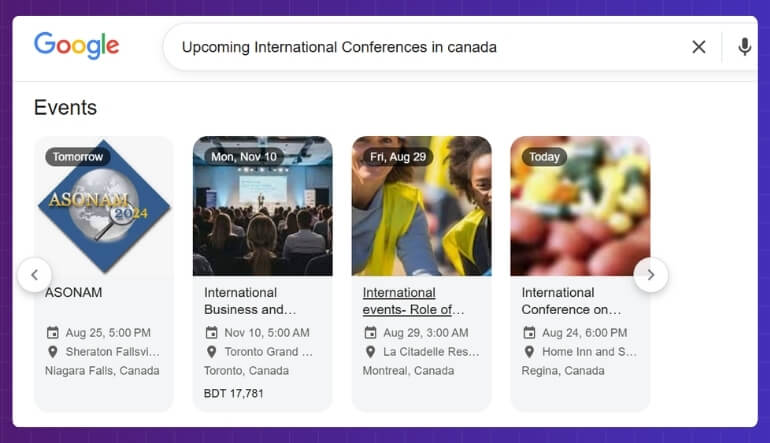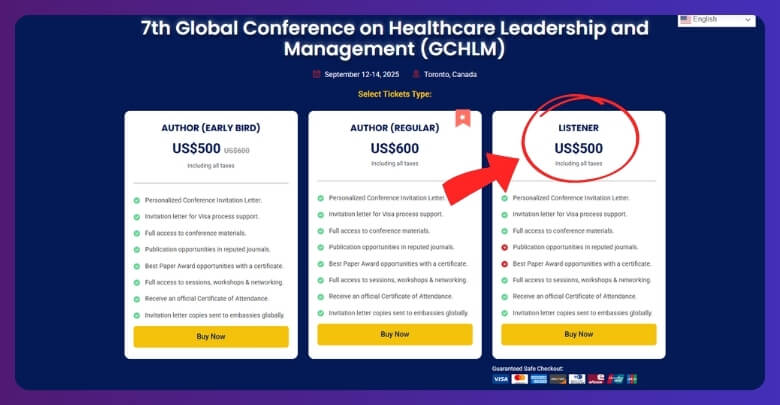International conferences bring people together from different parts of the world to share ideas, research, and experiences. They are not just about listening to speakers but also about meeting experts and learning new things. Many readers often wonder how can I attend international conference?
Attend an international conference by selecting a relevant event, registering early, applying for a visa if needed, and preparing your presentation or materials. During the event, join sessions, network with attendees, and follow up afterward to build lasting global connections and gain valuable experience.
Do you want to know how to prepare, register, or even find funding options for your trip? If you are curious, keep reading because this article gives you all the important steps and details you need about attending international conferences.
How Can I Attend International Conference?
Attending an international conference is a great way to learn new things. It helps you connect with people from different countries and backgrounds. You can share your knowledge and listen to others share theirs. It also gives you global experience that is very valuable.
Step 1: Find the Right Conference
To locate a suitable conference, you should use trusted websites and resources. Always check if the theme matches your area of study or work. Conferences can be in-person or online, depending on the organizer’s plan. Pick the one that best fits your personal goals.
Step 2: Check the Requirements
Before planning further, carefully read the details provided on the official site. Find out the venue, dates, and the types of attendees expected. Some conferences need research papers, while others allow normal participation. Make sure you meet all rules before spending time and money.
Step 3: Prepare Your Abstract or Paper
In case the conference requires research work, prepare your abstract carefully. Write in simple words and keep the structure easy to understand. Follow the official format given by the organizers on their website. Submit it before the deadline to confirm your eligibility for participation.
Step 4: Registration
When you have selected a conference, completing the registration is important. Fill out the online form with your personal and professional information. Look for early bird discounts or student rates to save money. After paying the fees, you will receive confirmation of successful registration.
Step 5: Visa and Travel Arrangements
If the conference is in another country, you might require a travel visa. The organizers usually provide an official invitation letter once you register. For example, if you’re planning to attend an upcoming international conference in Canada, applying early will save you unnecessary stress. Reserve your hotel in advance to avoid last-minute problems.
Step 6: Prepare for the Conference
Once you are registered, preparing for the actual event is essential. If presenting, design clear slides and practice your talk properly. Carry business cards or prepare a digital profile to share contacts. Study the schedule to decide which sessions are most useful for you.
Step 7: Attend and Network
During the event, join the sessions and try asking good questions. Talk with other participants to make new professional friends for the future. Attend side workshops because they give extra knowledge and better learning opportunities. Keep in contact with people after the conference to continue learning.
Step 8: Follow Up After the Conference
After the conference ends, keep in touch with the people you met. Share your presentation or notes with interested contacts for stronger bonding. Post updates about your learning experience on social media platforms. Staying active afterward helps you continue learning and also gain recognition.
Attending international conferences makes learning more exciting and useful for everyone. It is also a chance to meet people with similar interests. Preparing early ensures that your experience is smooth and completely enjoyable. By joining conferences, you grow knowledge and build strong international relationships.
Why Should You Attend an International Conference?
Attending an international conference is more than just sitting in a room and listening to speakers. It is a chance to explore fresh perspectives, share thoughts, and connect with people who have the same interests. Let’s look at why it matters.
New Learning
International conferences bring together experts and professionals from many places. They share their latest ideas, research, and discoveries. By listening and engaging, you can learn things you may not find in books or online articles. It’s an inspiring way to update your knowledge.
Meeting Experts
Conferences give you direct access to people who are well-known in their fields. You can ask them questions, hear about their experiences, and even get guidance. These moments of interaction can leave a strong impact and help you think differently.
Global Connections
Attending these events allows you to meet people from different countries and cultures. Building friendships and professional connections with them can open future opportunities. Sometimes, a simple conversation at a conference can lead to exciting collaborations later in life.
Career Growth
Joining such conferences can make your resume stronger. Employers often value people who stay updated and take part in international events. You also get to learn practical skills that are helpful for your work and future plans, giving you a real advantage.
Personal Development
Beyond career, conferences help you grow personally. Speaking with people, attending discussions, and sharing your own ideas boost confidence. It also sharpens communication skills and broadens your thinking. These experiences shape you in ways that last a lifetime.
Attending an international conference is not just about listening; it is about learning, connecting, and growing in many ways. It is an experience that can bring long-term benefits to both your personal and professional life.
What Are the Requirements to Join an International Conference?
Joining an international conference is a chance to take part in a bigger stage where people from different places share ideas. It can feel exciting and sometimes challenging, but with the right steps, it becomes easier to participate fully.
- Registration: Most conferences need you to sign up online through their official website. This step confirms your spot and allows organizers to prepare for your participation smoothly.
- Payment: A registration fee is usually required, which varies depending on the type of conference. Paying early often gives you discounts and secures your seat.
- Identification: Organizers often ask for ID or passport details for verification. This ensures that participants are genuine and helps maintain a safe environment.
- Abstract Submission: If you want to present, you may need to submit an abstract or paper. This allows experts to review your work before approval.
- Deadlines: Keeping an eye on important dates like registration deadlines or abstract submission dates is crucial. Missing them might mean losing your chance to join.
- Travel Documents: For international conferences, a valid passport and sometimes a visa are required. Checking the rules early helps avoid last-minute problems later.
- Accommodation: Arranging where you will stay during the conference is important. Many events provide hotel suggestions or special rates for registered participants.
Attending an international conference becomes simple when you follow the requirements step by step. Being prepared saves time, avoids stress, and ensures you can fully enjoy the valuable experience of connecting and learning with others.
How to Find Upcoming International Conferences Online
Finding upcoming international conferences online may seem confusing at first, but there are many simple ways to do it. With the right tools and websites, you can easily spot events that match your interests. Let’s explore some useful methods.
Search Engines
Using search engines is one of the easiest ways to look for conferences. Typing the right keywords, like “upcoming international conferences 2025,” can give plenty of options. Checking different results helps you compare details and find the most reliable ones.
Academic Platforms
Websites like Google Scholar or ResearchGate often list conferences connected with research and academic fields. These platforms are trusted by many professionals and are updated regularly. Browsing through them helps you discover events related to your subject or area of interest.
Event Websites
Popular event websites such as Eventbrite and Conference Alerts are designed to share event schedules. They allow you to search by date, location, or topic. This makes it easier to filter and focus on choosing the right international conferences that fit your goals.
University Pages
Many universities around the world host or share details about international conferences. Visiting their official websites often provides updated information about academic events. Universities usually post schedules early, giving participants enough time to plan and register without any rush.
Professional Groups
Professional organizations often organize or promote international conferences in their field. By visiting their official websites or joining their newsletters, you can stay updated. Many also post details on social media, which makes it even easier to keep track.
Searching for international conferences online is all about knowing the right places to look. With careful checking and smart use of trusted platforms, you can quickly find events that match your goals and interests.
How to Register for an International Conference?
Registering for an international conference may sound complicated, but it is actually quite simple when done step by step. With the right preparation and attention to detail, you can complete the process smoothly and secure your place with ease.
Step 1: Choose Your Conference
Begin by carefully selecting the conference you want to attend. Look at the topics, speakers, and location to be sure it matches your interests. Reading details about the event will help you understand if it is the right choice.
Step 2: Visit the Official Website
After deciding, go to the conference’s official website. This page usually has all the important details such as dates, venue, topics, fees, and registration steps. Always make sure you are on the correct official site before sharing your information.
Step 3: Fill Out the Registration Form
On the website, search for the registration tab or page. Enter your personal information, including name, email, phone, and country. Some events also ask about your organization or role. Check your details carefully before submitting to avoid possible mistakes.
Step 4: Pay the Registration Fee
Once the form is filled out, the next step is payment. Most conferences accept payment through debit cards, credit cards, or bank transfers. Some events give discounts for early registration, so booking in advance can save money and secure your place.
Step 5: Get Confirmation Email
After completing the payment, a confirmation email will be sent to your inbox. This message acts as proof of registration. Save the email or print a copy, because you might need to show it during the conference check-in process.
Step 6: Prepare Your Documents
Before the event, gather the required documents like your ID card, passport, or student card if needed. Keeping everything ready avoids last-minute stress. Double-check the requirements listed by the organizers to ensure you don’t face problems upon arrival.
Tips to Get a Travel Visa for International Conferences
Traveling abroad for a conference is an exciting opportunity, but it also comes with important formalities. One of the most important requirements is getting the right visa. With the correct approach, this process becomes smoother and less stressful for participants.
- Apply Early: Visa processes can take weeks or even months, depending on the country. Submitting your application on time helps avoid unnecessary delays and gives you more confidence about attending your conference.
- Gather Documents: Required papers usually include a valid passport, an invitation letter, a hotel booking, and financial proof. Keeping these ready ensures your application is complete and prevents last-minute confusion during submission.
- Check Embassy Rules: Each country has its own visa guidelines and updates them often. Reading the official embassy website gives you accurate instructions and saves you from relying on outdated or unreliable information elsewhere.
- Prepare for Interview: Some visas require an interview where officers ask about your visit purpose and background. Answering clearly, honestly, and confidently while showing proper documents increases your chances of approval without unnecessary problems.
- Financial Proof: Embassies often ask for bank statements or sponsorship letters to confirm you can cover your stay. Having strong financial records helps establish trust and reassures officials about your ability to handle expenses.
- Invitation Letter: A formal invitation from the conference organizers adds value to your application. It shows that you are attending for a genuine reason, making the approval process smoother in many countries.
- Keep Copies: Carry extra copies of your documents, like your passport, tickets, and application forms. Keeping digital copies stored safely also ensures you are prepared if originals get misplaced during your travels abroad.
Applying for a travel visa requires planning, patience, and attention to detail. Preparing documents, following embassy instructions, and applying on time reduces stress, increases approval chances, and makes your conference experience smooth and successful from the very beginning.
How Much Does It Cost to Attend an International Conference?
Attending an international conference is a rewarding experience, but it comes with expenses that must be planned carefully. Costs vary depending on the country, conference type, and your choices. Let’s break down the main expenses with approximate amounts.
Registration Fee
Most conferences charge a participation fee. Standard registration is usually around 600 USD, while early bird options can bring it down to about 500 USD. Registering early not only saves money but also ensures your seat at the event.
Travel Costs
Flights often take the biggest part of your budget. Prices vary depending on how far you travel, the airline you choose, and how early you book. International tickets can range from 700 USD for nearby destinations to over 2000 USD for distant ones.
Accommodation
Staying in hotels, hostels, or guesthouses can cost differently depending on the city. Many conferences suggest partner hotels offering discounts. On average, expect to spend around 400 USD for budget stays and up to 1000 USD for mid-range hotels.
Meals and Food
While some events cover lunch or snacks, most meals will be on your own. Daily costs depend on local food prices and your eating habits. Setting aside 200 to 400 USD ensures you can eat comfortably throughout your stay.
Local Transport
Moving around within the host city adds up. From airport transfers to daily rides between the hotel and venue, costs usually range between 100 and 300 USD, depending on the distance and transport type, like taxis, buses, or metro.
Visa and Insurance
A travel visa is often required, and fees vary by country. On average, visa costs range between 50 and 150 USD. Adding travel insurance for safety may raise the total to around 200 USD.
Total Estimate
When all costs are combined, attending an international conference usually falls between 1500 USD and 4500 USD. Careful planning, early booking, and smart choices help you stay within budget while enjoying the full experience of the event.
How to Apply for Scholarships or Funding for Conferences?
Attending a conference can be expensive, but scholarships and funding can help. Many organizers, universities, and organizations offer financial support to make it easier. If you plan properly, you can reduce or even cover most costs. Here are the steps you can follow.
Step 1: Check Conference Website for Funding Options
Most international conferences clearly mention whether they provide travel grants or fee waivers. Go through the “Funding,” “Grants,” or “Scholarships” section on the official site. Some events support students, early-career researchers, or participants from developing countries. Note all deadlines and required documents carefully.
Step 2: Contact the Organizers Directly
If you cannot find enough details online, email the organizing committee politely. Ask if they provide scholarships, travel grants, or fee discounts for participants. Sometimes opportunities are not highlighted publicly but are offered upon request. Keep your email professional, short, and respectful.
Step 3: Apply Through Universities or Institutions
Many universities and research institutions have special funds for academic events. These funds can cover registration fees, travel costs, or accommodation. Speak with your department, research supervisor, or student services office. Submit a formal request with the purpose and expected benefits explained.
Step 4: Explore NGO and Government Programs
Non-government organizations and even government departments often support professional development. Check if NGOs, research councils, or education boards in your country provide travel support. Some programs are designed especially for international exposure and skill-building. Search online and keep an updated list of opportunities.
Step 5: Prepare a Strong Application
When applying, write clearly why attending the conference is important for you. Show how it connects to your studies, research, or professional goals. Include your CV, acceptance letter (if presenting), and recommendation letters if required. Make sure all documents are complete and error-free.
Step 6: Apply Early and Track Deadlines
Funding options are often limited, and late applications are usually not considered. Prepare your application early so you have enough time for corrections. Keep a calendar of all deadlines and submit well in advance. Early submission increases your chances of approval for support.
Best Preparation Tips Before Attending an International Conference
Getting ready for an international conference can feel exciting and a little challenging at the same time. You meet people from many places, and every small preparation makes a big difference in how much you enjoy the event.
- Plan Travel Early: Booking flights and hotels ahead of time saves money and avoids last-minute stress. Early planning also gives you peace of mind and keeps everything more organized.
- Prepare Business Cards: Having simple and clear business cards helps others remember you. Handing them out makes connecting easier, and people can reach you later without confusion.
- Read About Speakers: Learning about the main speakers helps you know what topics will be covered. You can follow the discussion better and also ask more meaningful questions.
- List Questions to Ask: Writing down a few smart questions shows interest and confidence. It makes your conversations valuable and helps you learn more during the sessions.
- Pack Essentials Wisely: Bringing comfortable clothes, travel documents, chargers, and important items keeps you stress-free. Forgetting small things can cause trouble, so always pack carefully before leaving home.
- Review the Conference Schedule: Going through the schedule helps you decide which sessions to attend. Planning your day makes sure you don’t miss important presentations or useful workshops.
- Practice Your Introduction: Knowing how to introduce yourself in a clear way is helpful. A short introduction leaves a good impression and makes networking easier for you.
Preparation makes the entire event smoother and more enjoyable for everyone involved. Whether you are a student, researcher, or professional, understanding how the ideal attendees for international conference events prepare can help you plan better and make the most of the experience.
FAQs About How Can I Attend International Conference?
International conferences bring both excitement and uncertainty, especially for those attending for the first time. Getting answers ahead of time makes the experience smooth and stress-free. Here are some common questions with helpful answers.
What Should I Wear to an International Conference?
The way you dress makes a strong impression. Most conferences expect participants to wear formal or business casual clothing. Choose neat and comfortable clothes, especially if the sessions are long. Avoid overly casual outfits like shorts or flip-flops, unless clearly allowed.
How Can I Communicate if I Don’t Know the Local Language?
Many international conferences are held in English, but not always. Learning a few basic phrases in the local language can help. Using translation apps is also useful for small conversations. Most organizers arrange interpreters or translations for important sessions.
What Should I Carry in My Bag During the Conference?
It’s smart to carry a notebook, a pen, your phone charger, and business cards. A water bottle and some snacks can also help during long sessions. Keep your ID and conference badge with you. Staying prepared ensures you don’t miss important moments.
How Do I Make the Most Out of Networking?
Start by introducing yourself politely and showing genuine interest in others. Asking simple questions about their work or presentation helps build connections. Sharing business cards or contact details is important for staying in touch. Always follow up later with a short message.
Can I Attend Only Part of the Conference?
Yes, many conferences allow partial attendance. You can register for one-day passes if you cannot stay for the whole event. Check the official website for details about available options. Planning ahead makes sure you attend the sessions most useful for you.
What If I Feel Nervous About Talking to Strangers?
It’s normal to feel nervous in a new environment. Start by talking to people sitting near you or at smaller workshops. Asking about the conference itself is an easy way to begin. Over time, your confidence will grow as conversations get easier.
How Do I Stay Energetic During Long Conferences?
International conferences often have back-to-back sessions. Taking short breaks between talks helps you stay fresh. Drink enough water and eat light meals. Choosing sessions wisely also ensures you stay engaged instead of feeling tired.
Is It Important to Take Notes?
Yes, taking notes is very helpful. Writing down key points helps you remember ideas after the event. Notes also make it easier to share information with friends or colleagues. Keeping them organized allows you to revisit them when needed.
Conclusion
Attending an international conference can be simple when you know the right steps. From choosing the right event to preparing documents and networking well, each stage matters. If you’ve been asking yourself, “How can I attend international conference?” the answer is to plan early, follow the rules, and make the most of the opportunity.
To end on a helpful note, remember to book travel in advance, carry essential documents, and approach people with confidence. Keep a positive attitude, ask meaningful questions, and stay open to learning. Wishing you a smooth experience and great success in your upcoming conference.









